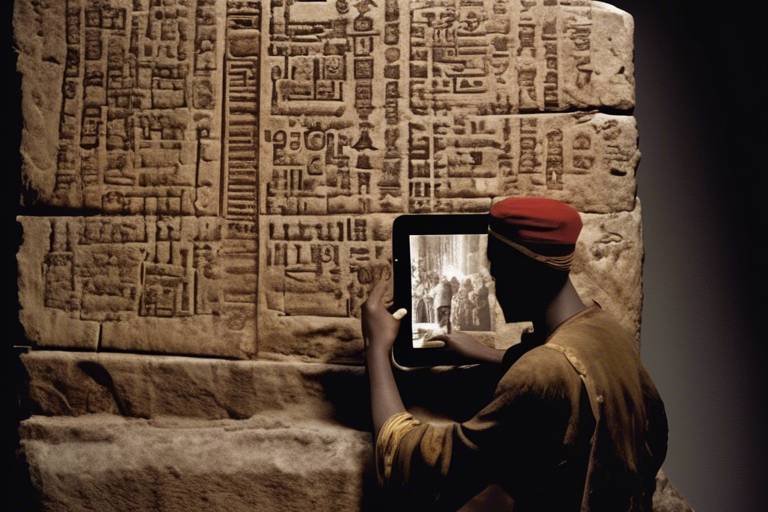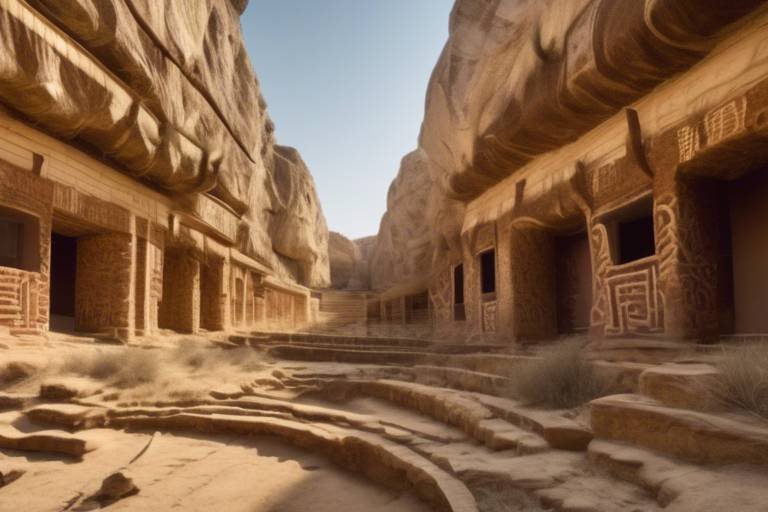Exploring the Importance of Preservation Ethics
Preservation ethics play a crucial role in safeguarding our cultural heritage and historical sites for future generations. By upholding ethical standards in preservation practices, we ensure that these valuable assets are protected and cherished. The concept of preservation ethics revolves around the idea of responsible stewardship, where the focus is not only on conserving physical structures but also on preserving the stories and memories embedded within them.
Preservation ethics encompass a set of principles that guide decision-making in heritage conservation. These principles emphasize the importance of authenticity, integrity, and sustainability in preservation efforts. By adhering to these principles, preservationists aim to strike a balance between safeguarding the past and meeting the needs of the present and future. It is a delicate dance between honoring history and embracing progress.
However, the field of preservation ethics is not without its challenges. One of the primary obstacles faced is the conflict between development pressures and conservation imperatives. Balancing the demands of urban growth and heritage preservation requires thoughtful planning and collaboration among stakeholders. Additionally, limited resources and competing interests often complicate preservation efforts, making it essential to find innovative solutions to overcome these challenges.
Stakeholders play a vital role in shaping preservation ethics and practices. Engaging with local communities, government agencies, heritage experts, and other relevant parties is essential for making informed decisions regarding heritage conservation. By involving stakeholders in decision-making processes, preservationists can ensure that diverse perspectives are considered, leading to more inclusive and sustainable outcomes.
Legal frameworks and regulations provide a solid foundation for upholding preservation ethics. These laws establish guidelines for heritage protection, outlining responsibilities and requirements for conservation projects. By aligning preservation efforts with legal frameworks, practitioners can navigate complex issues such as property rights, zoning regulations, and environmental concerns effectively.
Real-world case studies offer valuable insights into the practical application of preservation ethics. By examining successful and unsuccessful preservation initiatives, we can learn from past experiences and improve future conservation practices. These case studies highlight the importance of adaptive management, community engagement, and interdisciplinary collaboration in achieving preservation goals.
The future of preservation ethics is shaped by evolving trends and innovations in heritage conservation. As technology advances and societal values evolve, new approaches to preservation emerge, offering exciting possibilities for the field. From digital documentation techniques to sustainable conservation practices, the future promises a dynamic landscape for preservationists to explore and embrace.
Educational initiatives play a crucial role in promoting awareness and understanding of preservation ethics. Training programs, workshops, and public outreach efforts help cultivate a new generation of preservationists who are equipped with the knowledge and skills to uphold ethical standards in heritage conservation. By investing in education, we ensure that the legacy of our cultural heritage continues to be preserved and celebrated for years to come.

Definition of Preservation Ethics
Definition of Preservation Ethics: Preservation ethics encompass the moral principles and values that guide the conservation and protection of cultural heritage and historical sites. It involves the ethical considerations and decision-making processes aimed at safeguarding the integrity and significance of these valuable assets for present and future generations.

Principles of Preservation Ethics
Preservation ethics play a crucial role in safeguarding our cultural heritage and historical sites for future generations. By adhering to ethical principles, we can ensure the conservation and protection of valuable assets that hold significant historical, cultural, and social importance.
At the core of preservation ethics lie several fundamental principles that serve as guiding values in heritage conservation practices. These principles emphasize the importance of respecting the authenticity of cultural heritage, maintaining integrity in conservation efforts, and ensuring sustainability in preservation initiatives.
One key principle of preservation ethics is the principle of minimum intervention, which advocates for the minimal alteration of historical sites and structures to retain their original character and significance. By prioritizing conservation over restoration, this principle aims to preserve the authenticity and historical value of heritage assets.
Another essential principle is community engagement, highlighting the importance of involving local communities and stakeholders in preservation projects. By fostering collaboration and inclusivity, preservation ethics seek to ensure that heritage conservation efforts reflect the diverse perspectives and values of the communities they serve.
Furthermore, the principle of transparency underscores the importance of open communication and accountability in preservation practices. By promoting honesty and integrity in decision-making processes, this principle aims to build trust and credibility in heritage conservation initiatives.
Moreover, the principle of sustainability emphasizes the need to consider the long-term impact of preservation efforts on the environment, economy, and society. By adopting sustainable practices and balancing conservation with development, preservation ethics strive to ensure the continued relevance and viability of heritage assets.
In essence, the principles of preservation ethics serve as a moral compass that guides heritage professionals, policymakers, and communities in their efforts to protect and celebrate our shared cultural heritage.

Challenges in Preservation Ethics
Preservation ethics play a crucial role in safeguarding our cultural heritage and historical sites, ensuring that they are conserved for future generations to appreciate and learn from. In this article, we delve into the concept of preservation ethics, the principles that guide it, the challenges faced in upholding it, the role of stakeholders in its implementation, the legal frameworks that support it, real-world case studies, future trends, and the importance of educational initiatives in promoting awareness and understanding.
Preservation ethics are not without their challenges, as the delicate balance between development and conservation needs often presents complex dilemmas. One of the key challenges is the clash between the economic interests of development projects and the need to protect and preserve heritage sites. This conflict can lead to pressure to compromise on conservation standards in favor of economic gains, threatening the integrity of cultural heritage.
Another significant challenge is the lack of public awareness and appreciation for the importance of preservation ethics. Without widespread support and understanding from the community, efforts to conserve heritage sites may face opposition or indifference, making it difficult to implement effective preservation strategies.
Additionally, rapid urbanization and industrialization pose a threat to heritage sites, as the demand for land and resources often results in the destruction or alteration of historical structures and landscapes. Balancing the need for development with the preservation of cultural heritage requires careful planning and decision-making to ensure sustainable development practices that respect the value of heritage sites.
Furthermore, inadequate funding and resources for preservation projects can hinder conservation efforts, limiting the capacity to carry out necessary maintenance and restoration work. Securing financial support for preservation initiatives is essential to ensure the long-term sustainability of heritage conservation projects and the protection of valuable cultural assets.

Role of Stakeholders in Preservation Ethics
Stakeholders play a crucial role in the realm of preservation ethics, acting as key players in decision-making processes that impact cultural heritage and historical sites. These individuals or groups have a vested interest in the preservation and conservation of heritage assets, ranging from local communities and government bodies to heritage organizations and private entities. Their involvement is essential in ensuring that diverse perspectives are considered and that decisions align with the values and needs of the community.
By engaging stakeholders in preservation ethics initiatives, a more holistic approach can be adopted towards heritage management. This inclusive process allows for the identification of shared goals, the mitigation of conflicts, and the fostering of collaboration among various parties. Stakeholders bring unique insights, expertise, and resources to the table, enriching the decision-making process and enhancing the sustainability of conservation efforts.
Moreover, stakeholders serve as advocates for heritage preservation, raising awareness about the significance of cultural heritage and the importance of ethical practices in its safeguarding. Through their active participation, stakeholders contribute to the promotion of a culture of respect for heritage values and traditions, fostering a sense of ownership and responsibility towards preserving our shared past for future generations.

Legal Frameworks and Preservation Ethics
Legal frameworks play a crucial role in upholding preservation ethics and ensuring the protection of cultural heritage and historical sites. These frameworks provide the necessary guidelines and regulations to govern heritage conservation practices and prevent unauthorized alterations or destruction of valuable assets. By establishing legal frameworks, governments and organizations can enforce compliance with preservation standards and hold accountable those who violate ethical principles.
One significant aspect of legal frameworks in preservation ethics is the designation of heritage sites as protected areas. Through legislation and regulatory measures, authorities can safeguard important cultural landmarks and artifacts from potential threats such as urban development, natural disasters, or vandalism. By legally recognizing the significance of these sites, preservation efforts are given a solid foundation for long-term sustainability and protection.
Moreover, legal frameworks often outline the responsibilities of various stakeholders involved in heritage conservation, including government agencies, private entities, and local communities. By clearly defining the roles and obligations of each party, these regulations help foster collaboration and coordination in preservation initiatives, ensuring that diverse interests are taken into account while upholding ethical standards.
In addition to setting guidelines for conservation practices, legal frameworks also address issues related to funding, resource allocation, and enforcement mechanisms. By establishing provisions for financial support, incentives, and penalties, these regulations aim to promote sustainable conservation efforts and deter activities that could harm cultural heritage assets. Through effective implementation and monitoring, legal frameworks can contribute to the preservation of heritage sites for future generations to appreciate and enjoy.

Case Studies in Preservation Ethics
When delving into the realm of preservation ethics, it is crucial to examine real-world examples that showcase the application and impact of ethical principles in heritage conservation. Case studies serve as valuable narratives that illustrate the successes and challenges faced in preserving cultural heritage and historical sites.
One notable case study is the restoration of the ancient city of Pompeii in Italy. The preservation efforts in Pompeii have been a subject of international interest due to the archaeological significance of the site. By implementing preservation ethics, experts have been able to protect and conserve the ruins of Pompeii, offering insights into the daily life of ancient Romans while ensuring the site's longevity for future generations.
Conversely, the case of the Buddhas of Bamiyan in Afghanistan stands as a poignant example of the challenges in preservation ethics. The monumental statues, carved into the cliffs of Bamiyan Valley, were tragically destroyed by the Taliban in 2001. This act of cultural vandalism highlighted the importance of global cooperation and ethical considerations in safeguarding irreplaceable cultural heritage from destruction.
Examining these case studies not only sheds light on the significance of preservation ethics but also underscores the delicate balance between development pressures and the need to protect our shared heritage. By learning from past successes and failures, preservationists can refine their approaches and advocate for ethical practices in heritage conservation.

Future Trends in Preservation Ethics
As we look towards the future of preservation ethics, several key trends are emerging that will significantly impact heritage conservation practices. One of the most notable trends is the increasing focus on sustainable preservation methods that prioritize environmental responsibility and long-term viability. This shift towards sustainability reflects a growing awareness of the interconnectedness between cultural heritage and the natural environment, emphasizing the importance of preserving both for future generations.
Another important trend is the integration of technology in preservation efforts, with digital tools and virtual reality becoming valuable assets in documenting and reconstructing historical sites. These technological advancements not only enhance the accuracy and efficiency of conservation projects but also provide innovative ways to engage the public and raise awareness about the significance of cultural heritage.
Collaboration and community engagement are also emerging as key trends in preservation ethics, highlighting the importance of involving local communities and diverse stakeholders in decision-making processes. By fostering partnerships and inclusivity, preservation efforts can be more sustainable and culturally sensitive, ensuring that heritage conservation is a shared responsibility that benefits everyone involved.
Furthermore, there is a growing emphasis on adaptive reuse and creative conservation strategies that seek to revitalize historic buildings and sites while preserving their unique character and heritage value. This trend reflects a shift towards more holistic approaches to preservation that consider the social, economic, and cultural dimensions of heritage conservation, promoting a more integrated and sustainable future for historic places.
Overall, the future of preservation ethics is marked by a commitment to innovation, sustainability, inclusivity, and collaboration, shaping a dynamic landscape of heritage conservation practices that respond to the evolving needs and challenges of our time.

Educational Initiatives in Preservation Ethics
When it comes to preserving our cultural heritage and historical sites, education plays a crucial role in shaping the mindset of individuals involved in heritage conservation. Educational initiatives in preservation ethics are designed to raise awareness, foster a deep understanding of the importance of heritage preservation, and equip professionals with the necessary knowledge and skills to effectively carry out conservation practices.
These educational programs cover a wide range of topics, including the principles of preservation ethics, heritage management strategies, legal frameworks, and case studies highlighting both successful and unsuccessful conservation efforts. By immersing participants in real-world scenarios and ethical dilemmas faced in heritage preservation, these initiatives aim to instill a sense of responsibility and ethical decision-making in the preservation process.
One of the key benefits of educational initiatives in preservation ethics is the opportunity to engage with diverse stakeholders, including heritage professionals, government officials, community members, and the general public. By creating a platform for dialogue and collaboration, these programs facilitate a holistic approach to heritage conservation, ensuring that multiple perspectives and interests are taken into account.
Furthermore, educational initiatives in preservation ethics help bridge the gap between theory and practice, allowing participants to apply ethical principles in practical conservation projects. By encouraging hands-on learning experiences and promoting critical thinking skills, these programs empower individuals to become advocates for heritage preservation and champions of ethical conduct in the field.
Overall, investing in educational initiatives in preservation ethics is essential for building a sustainable future for our cultural heritage. By nurturing a new generation of informed and passionate conservationists, we can ensure that our heritage sites are protected for future generations to enjoy and appreciate.
Frequently Asked Questions
- What is the importance of preservation ethics in heritage conservation?
Preservation ethics play a crucial role in safeguarding cultural heritage and historical sites for future generations. By upholding ethical principles, we ensure the protection and sustainable management of these valuable assets, preserving our shared history and identity.
- How do the principles of preservation ethics guide heritage conservation practices?
The principles of preservation ethics provide a framework for decision-making in heritage conservation. They emphasize the respect for authenticity, integrity, and significance of cultural heritage, guiding professionals in responsible stewardship and sustainable development.
- What are the common challenges faced in preservation ethics?
Challenges in preservation ethics often stem from the need to balance conservation goals with development pressures. Issues like funding constraints, conflicting interests, and inadequate legal protection pose obstacles to effective heritage preservation efforts.
- Why is it essential to involve stakeholders in preservation ethics decisions?
Engaging stakeholders in preservation ethics ensures inclusive decision-making processes that consider diverse perspectives and interests. By involving local communities, experts, and authorities, we foster collaborative efforts towards sustainable heritage conservation.
- How do legal frameworks support preservation ethics and heritage preservation?
Legal frameworks provide the necessary regulations and guidelines to enforce preservation ethics standards and protect cultural heritage sites. They establish clear procedures for heritage management, ensuring compliance with conservation principles and ethical standards.
- What role do educational initiatives play in promoting awareness of preservation ethics?
Educational programs and training initiatives are essential in raising awareness about preservation ethics among professionals and the public. By educating individuals about the value of cultural heritage and ethical practices, we cultivate a culture of responsible heritage stewardship.



















